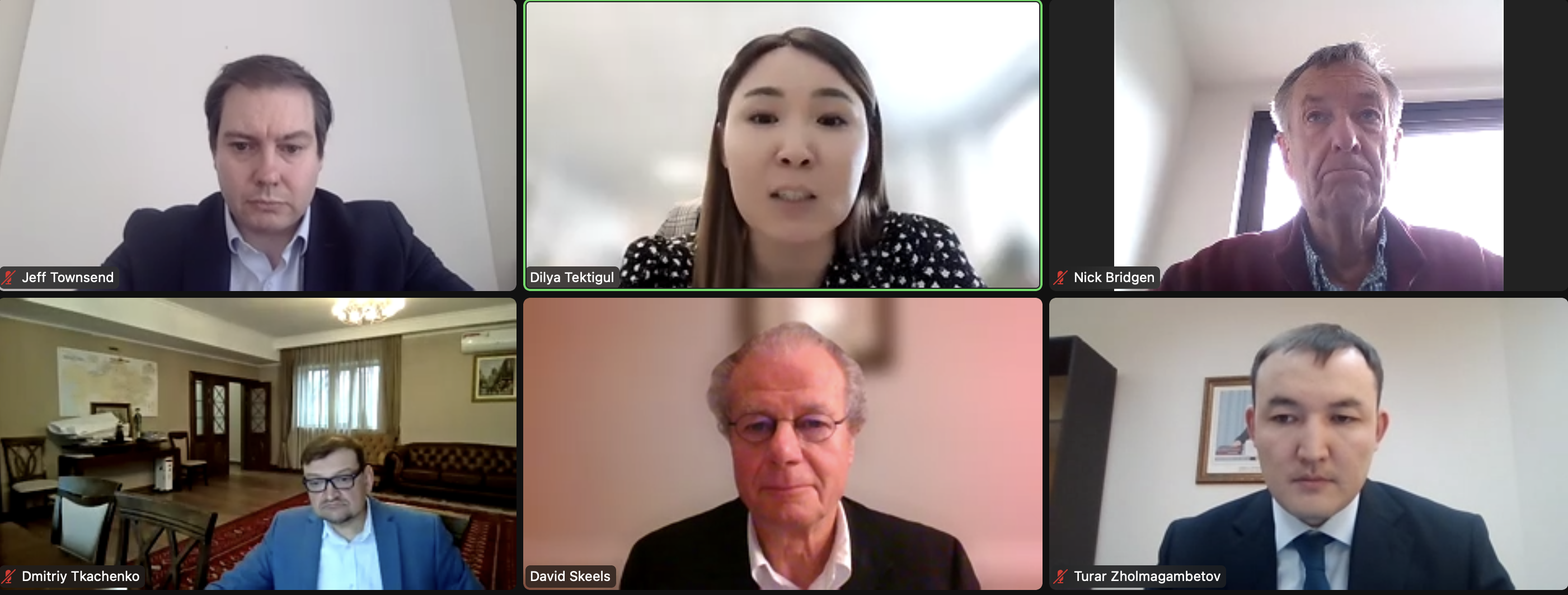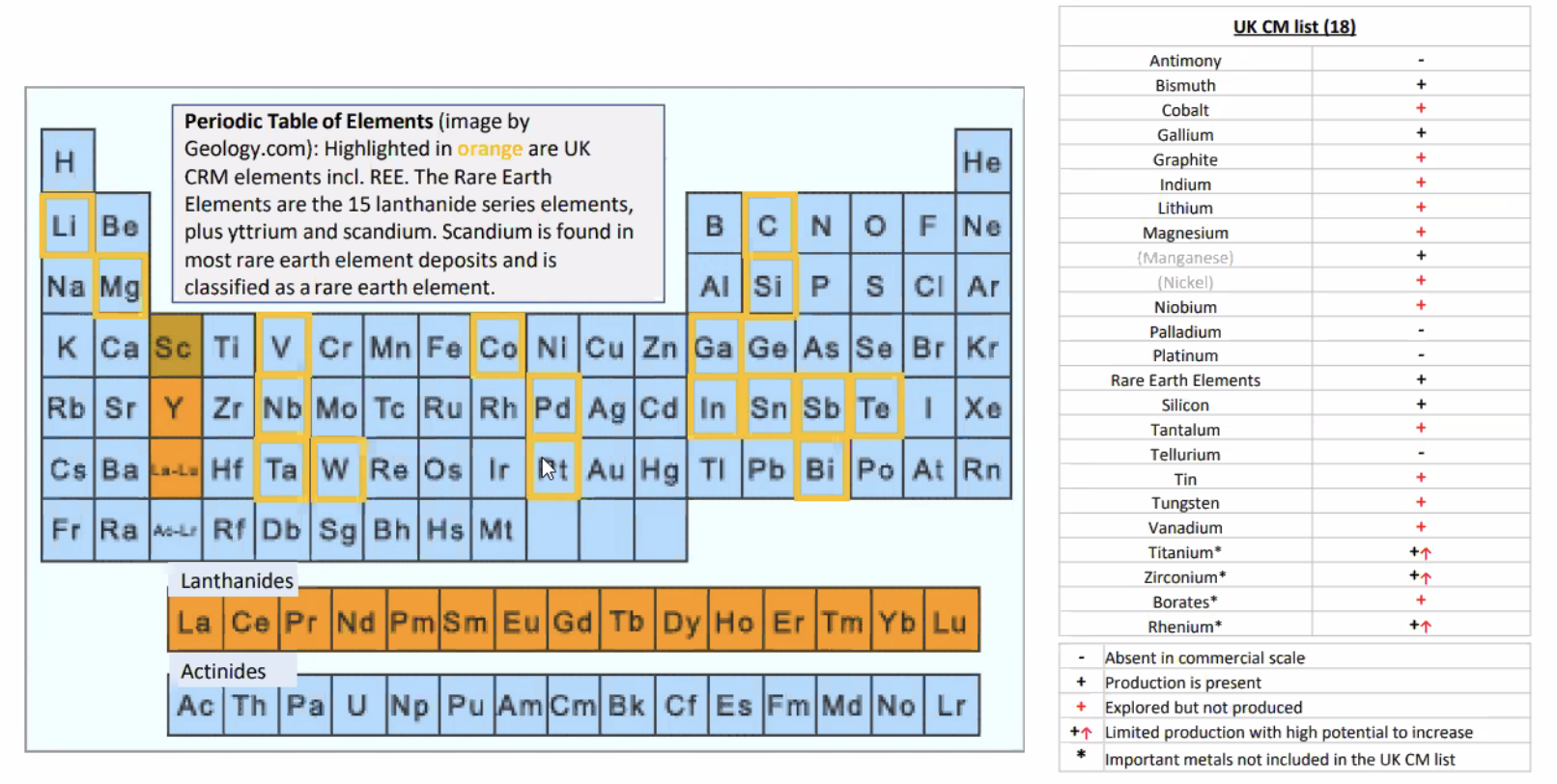LONDON – The U.K.-based companies are expanding their mining and metallurgical operations in Kazakhstan, as the country’s strong potential in critical minerals exploration and development aligns with the United Kingdom’s industrial strategy. This was noted at the webinar organized by the British-Kazakh Society (BKS) on April 6, which explored key trends and drivers for industrial cooperation between the two countries.

Photo credit: The Astana Times.
“Kazakhstan has a large reserve of minerals and a political will to develop rare earth deposits. As the world looks forward to diversifying supplies of critical minerals, Kazakhstan is at the forefront among other countries,” said Dilyara Tektigul, Regional Mining Lead at the Department for Business and Trade at the British Embassy in Astana, who moderated the online event.
The online panel discussion was hosted by BKS Director David Skeels.

The UK critical minerals list (18). The criteria listed in the table relate to Kazakhstan. Photo credit: Dmitriy Tkachenko.
Jeff Townsend, the co-founder of the Critical Minerals Association, a British industry-led organization set up in 2020 to ensure secure and sustainable critical mineral supply chains, noted that the UK is “not blessed with geology and has historically been a down-stream producer.”
“The UK has decided to do more to create an alternative supply chain, support this growth internationally, and make sure it is done in the right way through environmental, social, and governance compliance. It started to build relationships with like-minded nations and partner nations, and cooperation with Kazakhstan is one of the leading partnerships,” Townsend said.
He mentioned the UK’s first-ever critical minerals strategy adopted in July last year, which aims to accelerate the growth of domestic capabilities, ensure collaboration with international partners and enhance international markets by making them more responsive, transparent, and responsible.
“The British government has identified the required 18 critical minerals, a range from antimony and bismuth to tantalum, tellurium, magnesium, and niobium. Kazakhstan is going to be one of the key partners of the UK if it is to meet its industrial strategy. We simply cannot do it without our partner nations and our friends helping us to build up an integrated mid-stream production,” he said.
Speaking about Kazakhstan’s prospects, Turar Zholmagambetov, deputy chairman of the Industrial Development Committee at the Kazakh Ministry of Industry and Infrastructure Development, said that among 18 critical minerals identified by the UK, Kazakhstan has eight of them already in production. “And in the medium term, it is planned to launch a project for processing cobalt, lithium, tin, and tungsten as well,” he added.
The UK-based companies that are operating today in the mining and metallurgy sector of Kazakhstan include Arras Minerals, Central Asia Metals, Ferro-Alloy Resources, and Rio Tinto. The Meritan House British company has recently signed an agreement with Zhezkazganredmet, a Kazakh rare metals producer, on the production of rhenium and the attraction of technologies for the extraction of rare earth metallurgy.
“Kazakhstan is intensively attracting its foreign partners. For example, we held an auction for the granting of subsoil use rights in May, where we presented 25 of our deposits. Taking this opportunity, I would also like to invite all the participants to the Astana Mining and Metallurgy International Congress 2023 on June 1-2 on rare earth metallurgy with the participation of international experts,” said Zholmagambetov.
Dmitriy Tkachenko, a board member at the Chamber of Foreign Companies, highlighted Kazakhstan’s potential to become a key nickel and cobalt supplier in the future.
“Kazakhstan has significant reserves of nickel and cobalt. The main challenge is to find a proper combination of processing technologies for initial enrichment and conduct a hydrometallurgical process for the recovery of nickel,” he said.
Tkachenko underlined the growing importance of copper, saying that “it is not considered a critical metal, but remains crucial for the green economy, as it is one of the main metals for electric engines.” He emphasized that Kazakhstan’s potential in copper is substantial due to the availability of prospective deposits.
Ferro-Alloy Resources CEO Nick Bridgen focused on the development of the Balasauyskandyk vanadium ore deposit in the Kyzylorda Region of Kazakhstan. In his opinion, its exceptional characteristics are important for green economy development, making their project both environmentally friendly and cost-effective.
Compared with world reserves, Kazakhstan ranks first for total reserves and quality of chrome ores, second in reserves and resources of uranium and silver, and third for reserves of lead and proven reserves of manganese ores.
Three weeks ago, British Foreign Secretary James Cleverly and Bolat Akchulakov, then Energy Minister and currently Adviser to the President, signed a memorandum on a strategic partnership between Kazakhstan and the UK during Cleverly’s first visit to the Kazakh capital.
